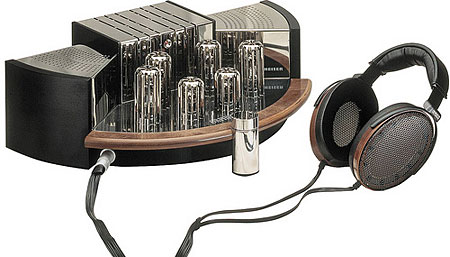Allisons Dad
Limp Gawd
- Joined
- Jul 30, 2012
- Messages
- 192

Gizmodo Link
In the early '90s, Sennheiser gave its engineers a mission: make the best headphones ever, irrespective of price. They came up with the Orpheus HE90. Only 300 were made. They initially sold for $16,000. Today they sell phone upwards of $30,000 on eBay.
The Orpheus is more proof-of-concept than anything else. Each set comes bundled with a dedicated tube amplifier (the HEV 90). There are six tubes in all, each protected by a metal casing. In the headphones themselves there is a ton of high-strength glass and gold. The setup supposedly has a range of 7 to 100,000 hertz, which goes far beyond what human ears are capable of hearing. The amp has an LED that flashes as its warming up (yes, these headphones need to warm up), and a dedicated volume control. It will support up to two headphones, but if you want a second pair, you're looking at $6,500, if you can even find 'em.
Components aside, the package looks absolutely gorgeous. It's something you would want prominently displayed in your living room, because it's a work of art. It looks more like it's something from the '60s, with its shining metal and its soft brown leather. The cups on the phones are very large and unless you have very large ears they'll definitely fit inside. Sorry, Mr. President. They are nicely padded, and they feel like something you'd never want to take off.
So, how do they sound? The clarity is absolutely unbelievable. There was so much detail, especially in the highs and mids, that it was almost like having your ear up against an acoustic guitar. It was so sharp that it was almost distracting, though I suspect you'd get used to it (and then get spoiled by it) over time. Vocals sounded incredibly natural and realistic. Sound was coming from a JR 800 Trans Rotor record player, which was playing Stockfisch Records Vinyl Collection 180g "Audiophile Vinyl Pressing." It was basically Cat Stevensesque folky stuff, so I couldn't evaluate the bass, but I've been told it's not as deep as more modern headphones. There is an excellent balance though.
So, was really enough to make me shed a tear? Not really. I was amazing and beautiful, but newer reference headphones (like Sennheiser's $1,500 HD 800, which I was able to listen to right next to the Orpheus) sound almost as good and will have fuller bass. At the same time, they do sound more... digital. The Orpheus is pretty much the ultimate in analog. If you ever get a chance to listen to them, take it.
Has anyone here ever heard or experienced these?
![[H]ard|Forum](/styles/hardforum/xenforo/logo_dark.png)